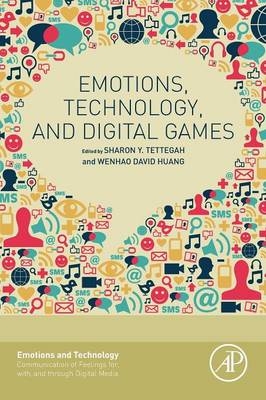
Emotions, Technology, and Digital Games
Academic Press Inc (Verlag)
978-0-12-801738-8 (ISBN)
This book takes this understanding and shows how it can be used in practical ways, including the design of video games for teaching and learning, creating tools to measure social and emotional development of children, determining how empathy-related thought processes affect ethical decision-making, and examining how the fictional world of game play can influence and shape real-life experiences.
Sharon Tettegah is a Professor in the Department of Teaching and Learning at the University of Nevada, Las Vegas and Former Program Chair of Digital Environments for Learning, Teaching and Agency in the College of Education, at the University of Illinois, at Urbana Champaign. She has an appointment in the Cognitive Neuroscience in Bio-Intelligence at the Beckman Institute for Advanced Science and Technology. In addition, she is a Research Scientist and affiliate at the National Center for Supercomputing Applications (NCSA). Her research centers on the intersection of STEM learning, Emotions, Equity and Social justice. She was also a Program Director in 2010-2012 at the National Science Foundation where she managed five programs in the Directorates of Education and Human Resources, Computer and Information Science and Engineering and including a NSF cross-cutting program on Science, Engineering, Education for Sustainability (SEES). She is also the Series Editor for Emotions and Technology with Elsevier, Academic Psychology Division. Dr. Wenhao David Huang is an Associate Professor at Department of Education Policy, Organization and Leadership at University of Illinois at Urbana-Champaign. His research interests are mainly focused on designing and validating technology-enabled learning engagement systems and environments across subject matter areas in organizations. Dr. Huang is particularly interested in better designing game-based learning and performance solutions for various groups of adult learners across learning and performance contexts, in order to sustain learners’ interests and efforts in engaging with intended affective, cognitive, and behavioral learning processes. Dr. Huang’s work on game-based learning articulates the relationships between learners’ motivational and cognitive processing, various design-relevant attributes for efficient game-based learning environments, learners’ dilemma when interacting with game-based learning environments where distractions are abundant, and considering game-based learning system as an integral part of the organizational learning and performance solution.
I. FRAMEWORKS OF EMOTIONS IN GAMES
1. Science of Emotions in Design of Video Games 2. Gamers and Their Weapons: An Appraisal Perspective on Weapons Manipulation in Video Games 3. Communicating Emotion through Gestures in Online Games
II. EMOTIONAL AFFORDANCES IN GAMES
4. Educational Neuroscience and the Affective Affordances of Video Games in Language Learning
5. The Design and Field Evaluation of an Interactive Digital Game to Identify and Compare Preschool Children’s Social and Emotional Skills
6. The Role of Story in Learning and Emotions
7. What Kind of Narratives Do Kids Like for Video Games? An Exploratory Study of Children’s Cognitive and Emotional Responses
8. Which Socio-Emotional Skills Do Online Games Teach
9. CyGaMEs Analytics and Data Visualization: Case Studies Showing Affective Response to Learning through Instructional Video Games
10. The Role of Emotion and Empathy in Ethical Decision-Making in Videogames
III. EMOTIONS EXTENDED BY GAMES 11. Digital Narrative: Exploring Issues of PTSD in a Virtual Environment
12. Half a Second That It Is Enough: Involuntary Micro-suspensions of Disbelief and Ectodiegesis as Phenomena of Immersional Processes in Pervasive Games
13. Emotional Response to Gaming Producing Rosenblatt’s Transaction
| Reihe/Serie | Emotions and Technology |
|---|---|
| Verlagsort | San Diego |
| Sprache | englisch |
| Maße | 152 x 229 mm |
| Gewicht | 610 g |
| Themenwelt | Geisteswissenschaften ► Psychologie ► Pädagogische Psychologie |
| Naturwissenschaften | |
| ISBN-10 | 0-12-801738-4 / 0128017384 |
| ISBN-13 | 978-0-12-801738-8 / 9780128017388 |
| Zustand | Neuware |
| Haben Sie eine Frage zum Produkt? |
aus dem Bereich


